- Formalizer A: Trained on Lean workbook pairs
- Formalizer B: Trained on 170K Claude-formalized statements
- Each problem receives multiple formalizations
Introduction
We introduce Goedel-Prover, an open-source language model that achieves state-of-the-art performance in automated formal proof generation for mathematical problems. A key challenge in this field is the scarcity of formalized mathematical statements and proofs, which we address through the following approaches. First, we train statement formalizers to translate natural language math problems from Numina into the formal language Lean 4, and use an LLM to verify that the formal statements accurately preserve the content of the original problems. This results in a dataset of 1.64 million formal statements. We then iteratively build a large dataset of formal proofs by training a series of provers: each prover is able to prove many statements that the previous ones could not, and these new proofs are added to the training set for the next prover. Despite using only supervised fine-tuning, our final prover (fine-tuned on DeepSeek-Prover-V1.5-Base) significantly outperforms the previous best open-source model, DeepSeek-Prover-V1.5-RL, which uses reinforcement learning (RL). On the miniF2F benchmark, our model achieves a success rate of 57.6% (Pass@32), surpassing DeepSeek-Prover-V1.5-RL by 7.6%. On PutnamBench, Goedel-Prover successfully solves 7 problems (Pass@512), ranking first on the leaderboard. Furthermore, it generates 29.7K formal proofs for Lean Workbook problems, nearly doubling the 15.7K produced by prior work. We provide extensive discussion of our training methodology, highlighting the key design choices that contribute to Goedel-Prover's strong performance. We then explore direct preference optimization (DPO) and other forms of reinforcement learning on top of Goedel-Prover-SFT, improving success to over 60% (Pass@32) on miniF2F. Additionally, we fully open source our code, model, and formalized statements to facilitate future research.
Key Achievements
Improving
+7.6%
over previous SOTA on miniF2F Pass@32
Solving
1.9X
total problems compared to prior works on Lean-workbook
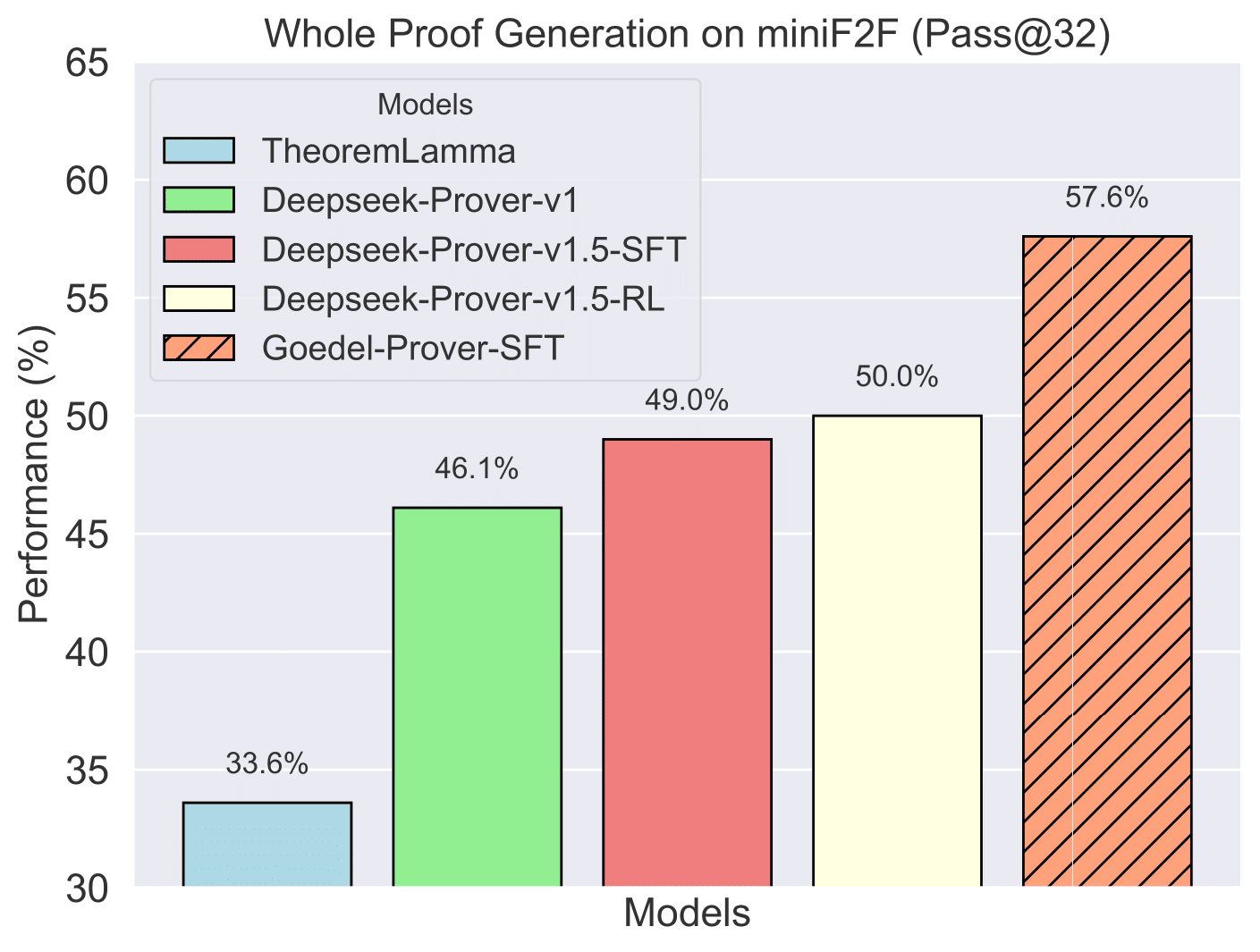
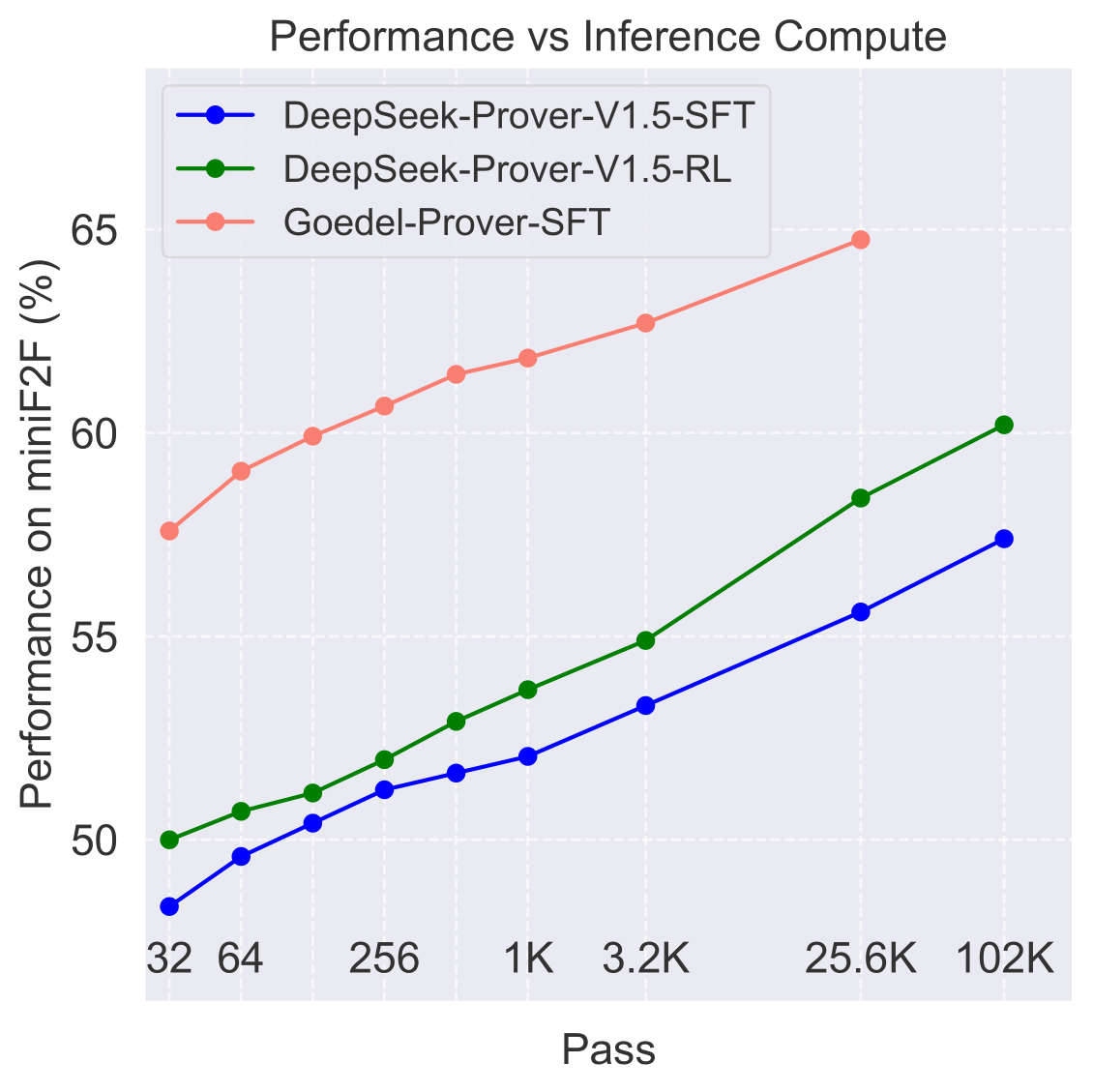
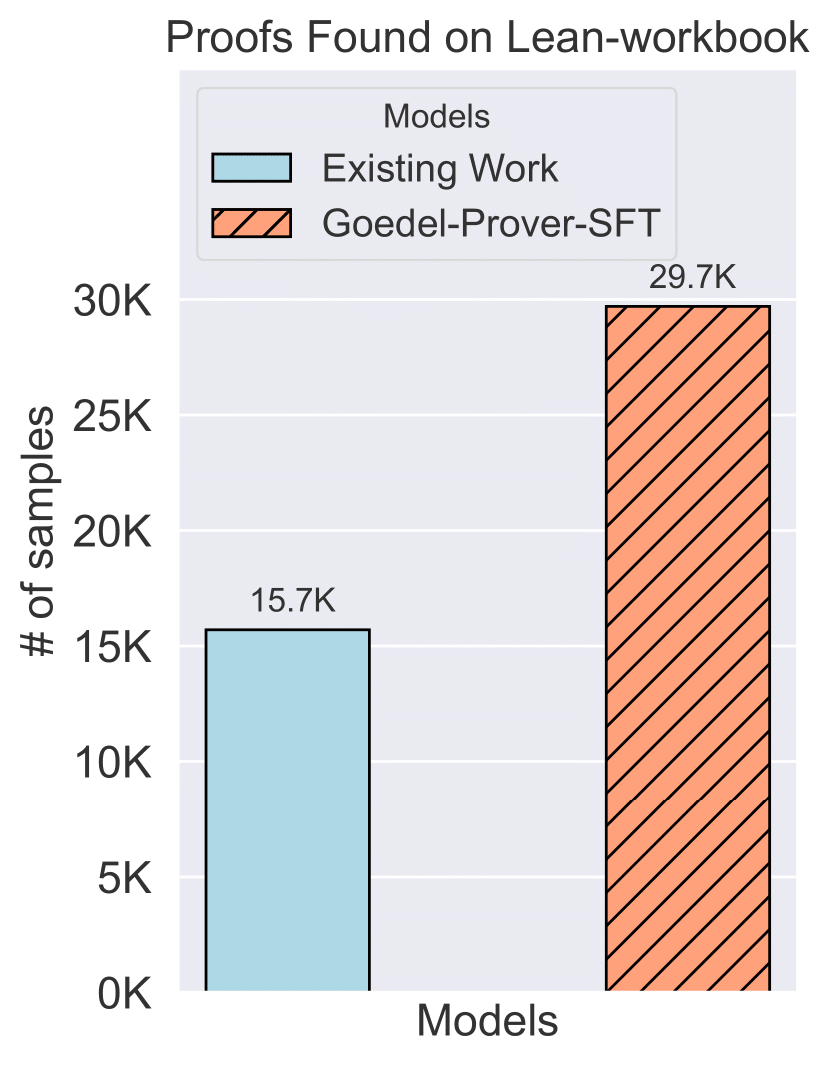
The Pass@N metric indicates that we generate N proofs for a single problem; if any one of these N proofs successfully solves the problem, it is considered solved. (Left): The performance of Pass@32 for full proof generation on miniF2F. Due to limited compute, we compare with DeepSeek-Prover-v1.5 on the Pass@32 metric. (Middle): This sub-figure presents a comparison of Goedel-Prover and Deepseek-Prover-v1.5 in terms of miniF2F performance across different inference budgets, ranging from Pass@32, 64, 128, ..., 4 × 6400, to 16 × 6400. (Right): The number of problems solved in Lean-workbook by Goedel-Prover-SFT compared to prior works. InternLM2.5-Step-Prover and InternLM-Math-Plus collectively solve and open-source 15.7K samples, while we solve and open-source 29.7K samples.
Methodology
Large-scale data synthesis and iterative training
Detailed Process
We train two distinct formalizers to enhance statement diversity:
Formalizer A: Trained using Qwen2.5-Coder-32B on natural language and formal language pairs from Lean workbook.
Formalizer B: Trained on 170K statements formalized by Claude-sonnet-3.5 and syntactically verified by Lean compiler.
Training completed in under 24 hours using 8 H100 GPUs. Each problem receives 16 total formalizations (8 from each formalizer).
- CC Test: Using LEAN compiler to verify syntax
- FC Test: Using LLM as judge to verify accuracy and completeness
Compiling Correctness (CC) Test
- Ensures formalized statements follow Lean syntax
- Must successfully compile with placeholder ":= by sorry"
Faithfulness and Completeness (FC) Test
- Evaluates accuracy of problem translation
- Uses Qwen2.5-72B-Instruct for assessment
- Generates 4 independent judgments per statement
- Statements below 0.5 FC score are filtered out
- Generate 16 proof candidates per statement
- Verify correctness
- Collect verified proofs
- Train new model and repeat process
Training Process
- Uses DeepSeek-Prover-V1.5-RL for initial proof generation
- Generates 16 proofs per problem
- Compiles proofs to verify correctness
- Retains one correct proof per statement
- Trains new model (Prover-Iter-k) based on Deepseek-Prover-v1-Base with collected proofs
- Iteratively improves through multiple training cycles
- 928K informal statements processed
- 1.64M formalized statements
- 140K Leanworkbook statements
- Total: 1.78M formal statements
Data Sources
- 860K problems from Numina datasets
- 68K private collection from Art of Problem Solving (AOPS)
- 140K statements from Leanworkbook and Leanworkbook-plus
Formalization Results
- 760K problems with dual formalizations (both Formalizer A and B)
- 123K problems with single formalization
- Comprehensive coverage across different mathematical domains
Experimental Results
Benchmarks
Following previous works, we primarily use miniF2F as our main evaluation benchmark. Additionally, we track performance on ProofNet, Lean-workbook, and FormalNumina. Lean-workbook contains 140K statements in total. FormalNumina is a private test set created by formalizing a randomly sampled collection of 250 problems from Numina. The benchmarks represent a diverse range of mathematical problems, from high-school level to undergraduate mathematics.
Main Results
Table 2: Full Proof Generation Performance on miniF2F
| Model | Pass | Performance |
|---|---|---|
| TheoremLamma | 128 | 33.6% |
| Deepseek-Prover-v1 | 32 | 46.1% ± 0.5% |
| Deepseek-Prover-v1.5-SFT | 32 | 48.2% ± 0.6% |
| Deepseek-Prover-v1.5-RL | 32 | 50.0% ± 0.5% |
| Goedel-Prover-SFT | 32 | 57.6% ± 0.7% |
| Deepseek-Prover-v1.5-SFT | 3200 | 53.3% |
| Deepseek-Prover-v1.5-RL | 3200 | 54.9% |
| Goedel-Prover-SFT | 3200 | 62.7% |
| Deepseek-Prover-v1.5-SFT | 4×6400 | 55.8% |
| Deepseek-Prover-v1.5-RL | 4×6400 | 58.5% |
| Goedel-Prover-SFT | 4×6400 | 64.7% |
Our Goedel-Prover-SFT achieves state-of-the-art performance on miniF2F, surpassing previous models by significant margins. The model shows consistent improvement across different computational budgets, achieving 57.6% at Pass@32, 62.7% at Pass@3200, and 64.7% at Pass@4×6400.
Table 3: Performance Comparison Across Different Datasets
| Model | miniF2F | ProofNet | FormalNumina | Lean-workbook |
|---|---|---|---|---|
| Deepseek-Prover-v1.5-RL | 50.0% | 16.0% | 54.0% | 14.7% |
| Goedel-Prover-SFT | 57.6% (+7.6) | 15.2% (-0.8) | 61.2% (+7.2) | 21.2% (+6.5) |
The model demonstrates strong performance across multiple datasets, with notable improvements in miniF2F, FormalNumina, and Lean-workbook benchmarks. While performance on ProofNet shows a slight decrease, the overall average performance shows a significant improvement of 5.4 percentage points.
Table 4: Number of Problems Solved on PutnamBench (out of 644)
| Ranking | Model | Type | Num-solved | Compute (Pass) |
|---|---|---|---|---|
| 1 | Goedel-Prover-SFT ♦ | Whole Proof Generation | 7 | 512 |
| 2 | ABEL | Tree Search Method | 7 | 596 |
| 3 | Goedel-Prover-SFT ♦ | Whole Proof Generation | 6 | 32 |
| 3 | InternLM2.5-StepProver ♦ | Tree Search Method | 6 | 2×32×600 |
| 5 | InternLM 7B | Whole Proof Generation | 4 | 4096 |
| 6 | GPT-4o | Whole Proof Generation | 1 | 10 |
| 7 | COPRA (GPT-4o) ♦ | Whole Proof Generation | 1 | 1 |
| 8 | ReProver w/ retrieval ♦ | Tree Search Method | 0 | 1 |
| 9 | ReProver w/o retrieval ♦ | Tree Search Method | 0 | 1 |
On the challenging PutnamBench dataset, Goedel-Prover-SFT achieves new state-of-the-art performance, solving 7 out of 644 problems with Pass@512, ranking the first place at the Putnam Leaderboard. ♦ indicates a open-source model.
Iterative Training Details
Given a set of formalized statements, we start by employing DeepSeek-Prover-V1.5-RL to generate 16 proofs for each problem. We evaluate these proofs and retain one valid proof per statement. Using this curated collection, we conduct supervised fine-tuning (SFT) on DeepSeek-Prover-V1.5-Base, resulting in Prover-Iter-1. This iterative process continues, with each version, Prover-Iter-k, generating new answers and training the model for subsequent iterations. Importantly, Prover-Iter-k is trained based on the proofs collected from the previous iteration, Prover-Iter-(k-1). Additionally, we gradually increase the number of statements throughout the iterative training process. Starting from Iteration 6, we also incorporate Mathlib into the training data. The details of the data statistics for each iteration are presented in the table below.Table 6: Iterative Training Details
| Iteration | Statements | Training Data | |||
|---|---|---|---|---|---|
| Lean-workbook | Formalized Statements | Lean-workbook Solved | Formalized Proofs | Mathlib | |
| Iter-0 | 140K | 0 | 20.6K | 0 | 0 |
| Iter-1 | 140K | 140K | 20.6K | 72.4K | 0 |
| Iter-2 | 140K | 270K | 23.0K | 128.7K | 0 |
| Iter-3 | 140K | 270K | 24.4K | 161.2K | 0 |
| Iter-4 | 140K | 882K | 25.4K | 425.8K | 0 |
| Iter-5 | 140K | 882K | 27.0K | 436.5K | 0 |
| Iter-6 | 140K | 882K | 27.8K | 443.2K | 104K |
| Iter-7 | 140K | 1.64M | 28.8K | 887.7K | 104K |
| Iter-8 | 140K | 1.64M | 29.7K | 915.7K | 104K |
| Iter-9 | 140K | 1.64M | 30.3K | 928.2K | 104K |
The model's performance across four datasets during iterative training is shown below.
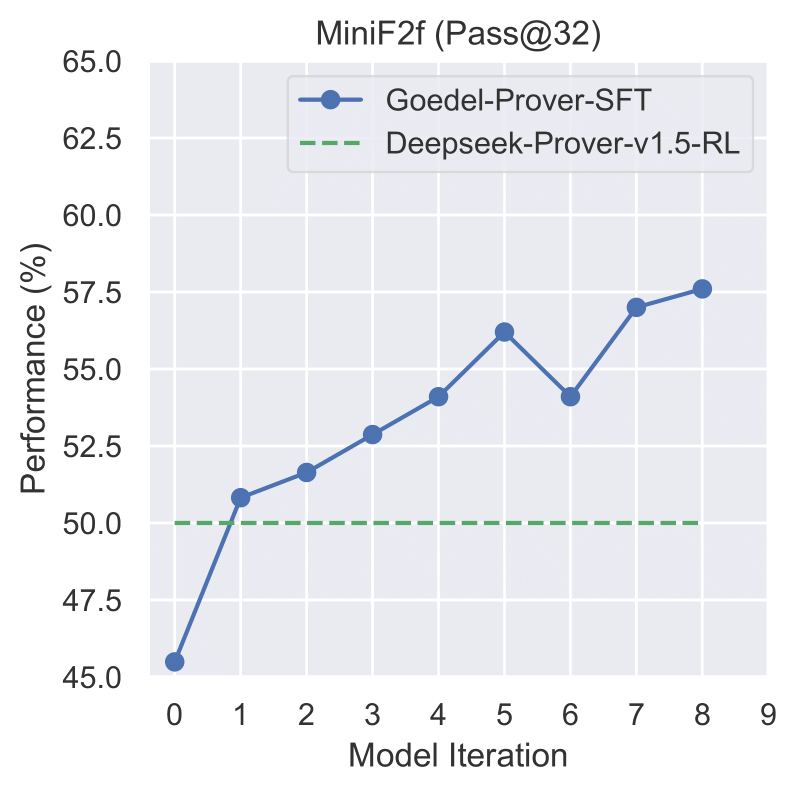
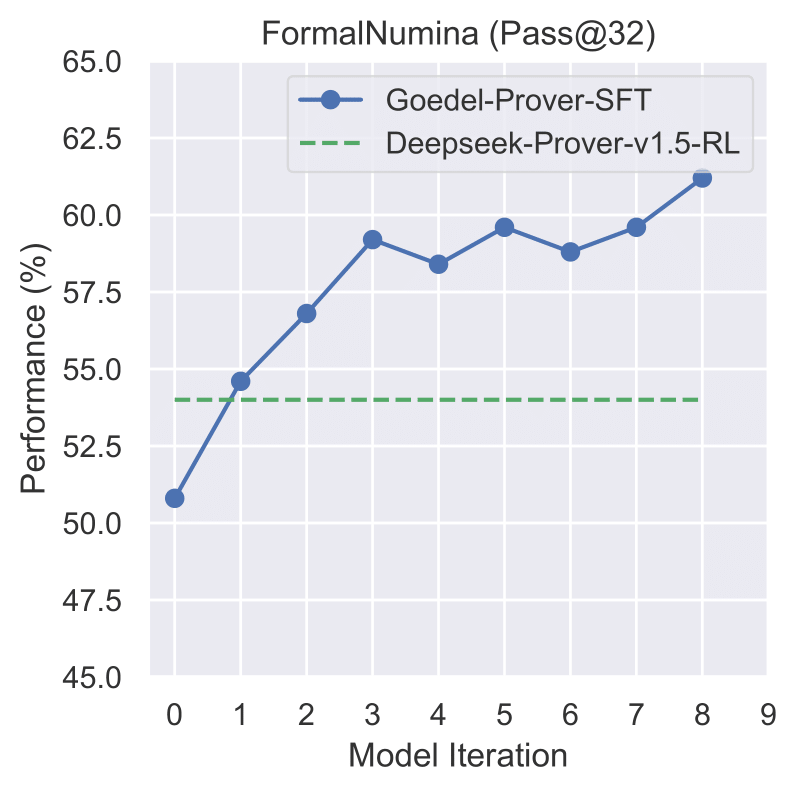
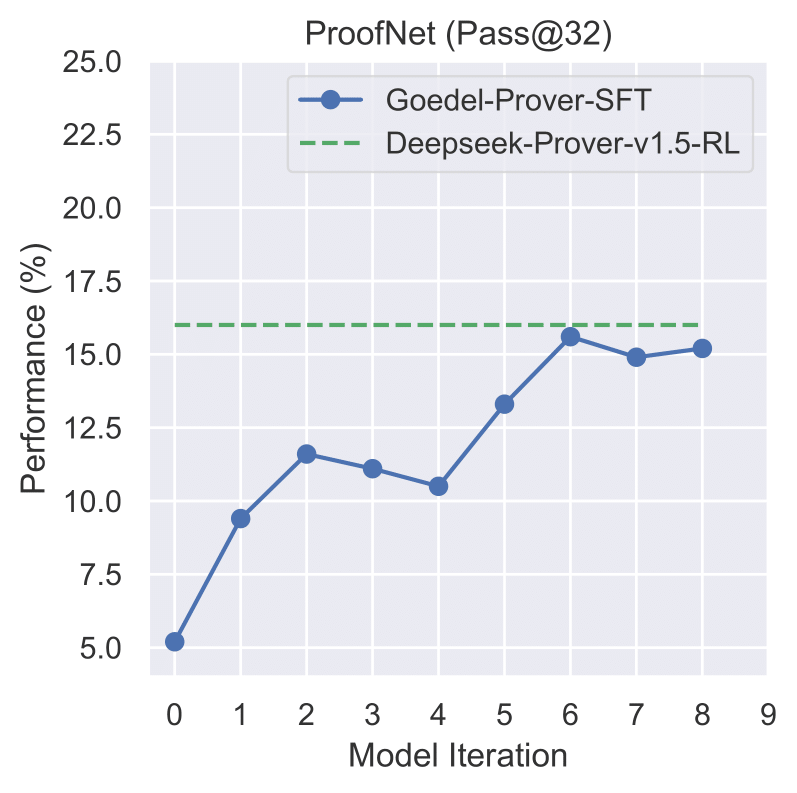
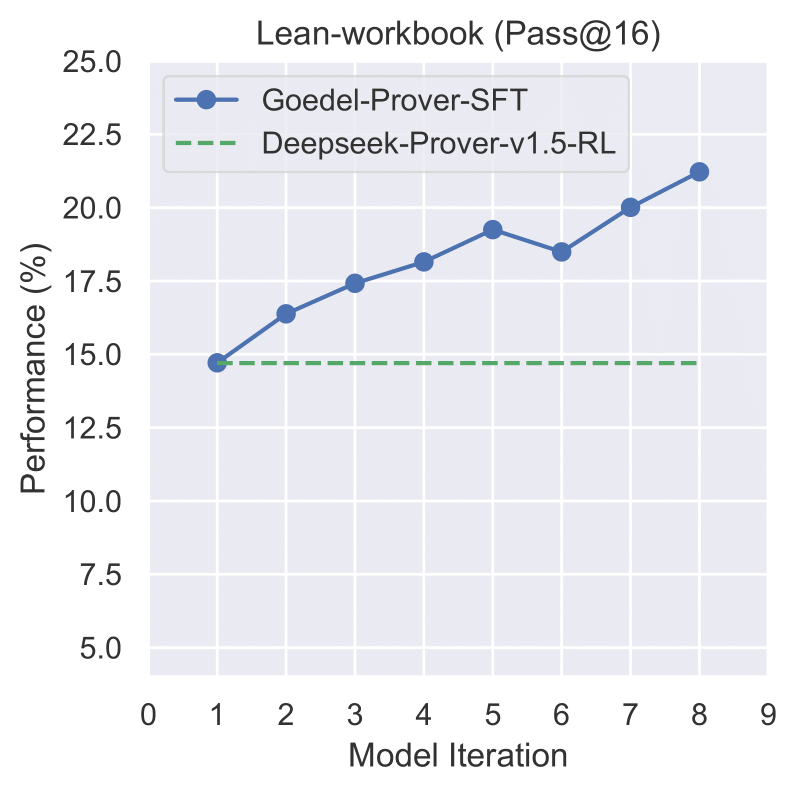
The performance trends illustrated in Figures 1-4 demonstrate the consistent improvement of our model across different datasets during the iterative training process.
Key Findings
- Achieving state-of-the-art performance of 57.6% on miniF2F at Pass@32
- Ranking the 1st on the PutnamBench Leaderboard with 7 problems solved out of 644 with Pass@512
- Cumulatively solving 29.7K problems in Lean-workbook. We significantly increase the 15.7K proofs found by prior works.
- Iterative training process demonstrates consistent improvement in model performance
BibTeX
@misc{lin2025goedelproverfrontiermodelopensource,
title={Goedel-Prover: A Frontier Model for Open-Source Automated Theorem Proving},
author={Yong Lin and Shange Tang and Bohan Lyu and Jiayun Wu and Hongzhou Lin and Kaiyu Yang and Jia Li and Mengzhou Xia and Danqi Chen and Sanjeev Arora and Chi Jin},
year={2025},
eprint={2502.07640},
archivePrefix={arXiv},
primaryClass={cs.LG},
url={https://arxiv.org/abs/2502.07640},
}